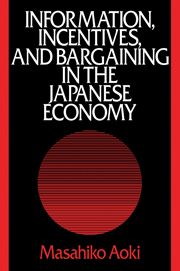 Information, Incentives and Bargaining in the Japanese Economy
Information, Incentives and Bargaining in the Japanese Economy Book contents
- Frontmatter
- Contents
- List of figures
- List of tables
- Preface
- 1 Introduction
- 2 The information structure of the J-firm
- 3 The ranking hierarchy of the J-firm as incentive scheme
- 4 Corporate finance, stockholding returns, and corporate governance structure
- 5 Bargaining game at the J-firm
- 6 The changing nature of industrial organization
- 7 Bureaupluralism
- 8 Culture and economic rationality
- Author index
- Subject index
- Frontmatter
- Contents
- List of figures
- List of tables
- Preface
- 1 Introduction
- 2 The information structure of the J-firm
- 3 The ranking hierarchy of the J-firm as incentive scheme
- 4 Corporate finance, stockholding returns, and corporate governance structure
- 5 Bargaining game at the J-firm
- 6 The changing nature of industrial organization
- 7 Bureaupluralism
- 8 Culture and economic rationality
- Author index
- Subject index
Summary
By the time the Pacific War ended with the unconditional surrender of Japan in August 1945, about one-quarter of Japan's national assets (excluding weaponry) existing at the beginning of the year had been destroyed. In the ensuing years, soldiers returning from the battlefields and immigrants from former colonial lands, as well as those released from war materials production, joined the ranks of the job seekers. The number of job seekers during the first few years of the postwar period was about one-quarter of the total labor force. The level of production in 1946 dropped to about 40 percent of the prewar level of 1934-6. For most Japanese, the 1940s were nothing but a series of daily struggles for survival. The entire nation was swept up in great social turmoil and drastic institutional changes.
Upon the new ground of the institutions shaped in the turmoil, however, the engine of growth started to run in the 1950s. An unprecedented growth rate of more than 10 percent per annum was realized throughout the 1960s, and the gains from this growth were widely distributed among diverse social groups. Even so, Japan was still considered a “fragile flower” because of its meager natural resources. Then in the 1970s Japan was hit by a series of shocks - environmental pollution, escalating oil prices, the shift to a flexible exchange system, and new waves of technological innovation.
- Type
- Chapter
- Information
- Information, Incentives and Bargaining in the Japanese EconomyA Microtheory of the Japanese Economy, pp. 1 - 6Publisher: Cambridge University PressPrint publication year: 1988


